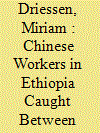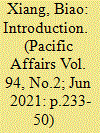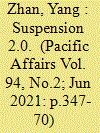|
|
|
Sort Order |
|
|
|
Items / Page
|
|
|
|
|
|
|
| Srl | Item |
| 1 |
ID:
178756


|
|
|
|
|
| Summary/Abstract |
Ever since Beijing has sought to fuel domestic growth through Chinese-led development overseas—first under the aegis of Jiang Zemin’s Going Out Policy and more recently as part of Xi Jinping’s Belt and Road Initiative—thousands of Chinese have moved overseas for work. Africa has been one of the destinations of Chinese companies and their expatriate staff. Although we have learned a great deal about China’s mega-projects across the African continent, little is known about the certified engineers and experienced builders who carry them out. What brings them to Africa? And, more importantly, what makes them stay for years on end, even if they wish to return to China? In this article I zoom in on the lives of Chinese men employed in Ethiopia’s construction industry to show how three decades of domestic growth in China has pushed workers overseas, while jeopardizing their return. Workers’ lives are marked by double displacement. They are not only isolated from local African communities through a dormitory labour regime that controls their time and limits their mobility, but also, more importantly, they are displaced from social life in China. Domestic development has at once increased aspirations and made them harder to obtain, especially for men, who are expected to fulfill the promise of upward social mobility for themselves and their families. In order to realize aspirations and meet social expectations related to social reproduction, geographic mobility has become a necessity for men who cannot rely on family wealth or connections, forcing them into a state of suspension.
|
|
|
|
|
|
|
|
|
|
|
|
|
|
|
|
| 2 |
ID:
178759


|
|
|
|
|
| Summary/Abstract |
This essay examines two films by the Chinese documentary filmmaker Wang Bing about temporary migrant workers in small, privately owned garment workshops in Zhejiang Province, China: Bitter Money (Ku Qian; 2016) and 15 Hours (Shi Wu Xiao Shi; 2017). Wang’s films portray Chinese garment workers’ lived experiences of “suspension,” as defined by Biao Xiang in this issue, in unique cinematic ways. Social sciences have paid close attention to the experiences of migrant workers, but art documentaries use audiovisual and aesthetic means to explore their everyday reality, producing what D. MacDougall calls distinctive “affective knowledge.” Wang’s films are usually categorized as part of the Sixth Generation of Chinese filmmakers, known for capturing social issues through observational methods. In this essay, I identify Wang’s works with the aesthetics of “slow cinema” and a global documentary trend in the visual arts as theorized by T. J. Demos in The Migrant Image. Based on close observation coupled with empathetic insight, Wang develops his own subjective method to portray people in a transformed and still changing China, where suspension is a common state of being. Ultimately, Wang’s films not only make the personal experiences of migrant workers visible and tangible, but also problematize their underlying, collective condition of suspension due to the contract labour system and associated hypermobility. The suspension approach suggests a productive way of bringing documentary art and social sciences into dialogue.
|
|
|
|
|
|
|
|
|
|
|
|
|
|
|
|
| 3 |
ID:
178751


|
|
|
|
|
| Summary/Abstract |
“Suspension” is the translation of the Chinese term xuanfu, which has been widely used in public discussions in China since the mid-2010s. Suspension indicates a state of being in which people move frequently, conduct intensive labour, and pause routine life—in order to benefit fast and then quickly escape. People keep moving, with no end in sight, instead of changing their current conditions, of which they disapprove. As a result, frantic entrepreneurial energy coexists with political resignation. Suspension is a life strategy, a multitude of experiences, a feeling—and now, a keyword: a crystallized consciousness with which the public problematize their experiences. This special issue develops this term into an analytical approach based on ethnographic research involving labour migrants in and from China. This approach turns migration into a basis for critical analyses on issues far beyond it; enables co-research between researchers, migrants, and the broader public; and seeks to cultivate agency for change among actors. This introductory essay, based on the author’s long-term field research and public engagement, outlines why we need such an approach, and how we might develop it.
|
|
|
|
|
|
|
|
|
|
|
|
|
|
|
|
| 4 |
ID:
178753


|
|
|
|
|
| Summary/Abstract |
Between 1978 and 2018 the percentage of the Chinese workforce in the service sector rose from 12.2 to 46.3. A large share of this workforce is in sales, selling products ranging from household goods, insurance, advertising space, and education, to various other services. The proliferation of salespeople in China is facilitated by the dramatic increase in the number of university graduates. Personnel in sales jobs, which are particularly popular among graduates from rural backgrounds with degrees from universities with indifferent reputations, experience an extraordinarily high level of mobility. They typically change jobs every few months, either because they are fired or they pursue better opportunities. Based on one year of fieldwork undertaken between 2015 and 2017, this article shows how the rapid expansion of China’s higher education subjects students from rural backgrounds to new inequalities, which, in turn, reconfigure the rural-urban divide into multiple intersecting hierarchies. Building on the concept of complexed development, this article analyzes how salespeople experience contradictory mobilities in a web of intersecting hierarchies. It shows how they achieve upward status mobility by breaking away from agricultural and manual labour and becoming university graduates and white-collar workers; but also, how they sometimes experience downward mobility in terms of income in comparison to previous generations of migrants and their less-educated peers.
|
|
|
|
|
|
|
|
|
|
|
|
|
|
|
|
| 5 |
ID:
178752


|
|
|
|
|
| Summary/Abstract |
Communities with large concentrations of migrants, who often live in makeshift and illegal housing, have been common on the margins of large cities in China since the 1980s. Why do so-called “urban villages” persist and even flourish despite repeated government crackdowns? By addressing this question, this article sheds light on a subtle dynamic of city making that has not been fully appreciated by scholarly literature and media reports that have focused on large-scale demolition and eviction in China’s rapid urbanization. Drawing from my two years of field research in Hua village, a community on Beijing’s fringes in line for land expropriation, I explore how multilateral negotiations between local residents (villagers), migrant tenants, the village committee, and municipal government led to a cyclical movement of temporary housing construction, demolition, and extension. The dynamics of recurring demolishment and reconstruction engendered spaces of suspension, which enabled migrants to enter the urban economy at a low cost. Such spaces, however, offered no formal protection or basis for developing lasting social relations, and always faced the prospect of being demolished, but nevertheless were constantly available and even expanding.
|
|
|
|
|
|
|
|
|
|
|
|
|
|
|
|
| 6 |
ID:
178757


|
|
|
|
|
| Summary/Abstract |
Since the late 2000s, many rural-to-urban migrants in China have lost their rural land to development plans, resettled in designated areas, and acquired formal urban residency. They stopped migrating, and have apparently ended their life of “suspension,” namely protracted mobility. While most existing research literature on this population foregrounds the issue of land dispossession, this article argues that, following resettlement, these former migrants’ lives can be more accurately characterized as a state of suspension instead of dispossession. Many resettled young adults, while having secured livelihood thanks to state compensation, are excluded from the technology- and capital-intensive developments to which they have lost their land. Some of these young people instead became petty speculators and rentier capitalists by liquidating their compensated assets through mortgages, private lending, rent, and other financial means. They are constantly waiting for the next investment opportunity and windfall gain. Although physically settled down and economically secure, they remain anxious and unsettled. They continue to orient their lives towards an elusive future rather than striving to transform the here and now, thus living in a state that I call “suspension 2.0.”
|
|
|
|
|
|
|
|
|
|
|
|
|
|
|
|
| 7 |
ID:
178754


|
|
|
|
|
| Summary/Abstract |
The article examines temporary extramarital cohabitation arrangements between low-wage Chinese female migrants and their male counterparts in Singapore, a phenomenon which is widely referred to by the migrants as becoming a “temporary couple” or “teaming up to have a life.” In the simulated households, the men usually shoulder most of the daily expenses for both members, while the women are expected to take care of the men’s intimate needs and most of the housework. The vast majority of the women involved in such arrangements are married and migrated for work on their own. This article, based on ethnographic fieldwork conducted between 2016 and 2019, explores how these women perform and understand such temporary intimacies. I first demonstrate that the women enter the relationships as a reaction to the institutional setup that places them in a suspended status, in which they are treated as nothing more than temporary labourers. I then illustrate how the women put the relationship in a state of suspension: they instrumentalize it as a means to maximize savings, and mark it out as a short-term exception that will end abruptly once they leave Singapore. The structurally imposed and self-inflicted conditions of suspension limit the women’s agency to an ambiguous private domain that is away from both work and home. Drawing on my long-term ethnographic fieldwork, this article deploys the notion of suspension as a guiding concept to unravel the tensions and moral anxieties that the women experience with their temporary intimacies.
|
|
|
|
|
|
|
|
|
|
|
|
|
|
|
|
| 8 |
ID:
178755


|
|
|
|
|
| Summary/Abstract |
This article explores the “ethical labour” of suspension––the conscious effort of deferring one’s ethical judgement and reflections in order to avoid irreconcilable ethical conflicts between one’s present activities and long-term goals. While people engage in ethical judgement and reflections in everyday social interactions, it is the laborious aspect of regulating one’s ethical dispositions that I highlight in the concept of “ethical labour.” Although it cannot be directly commodified, ethical labour is a form of labour as it consumes energy and is integral to the performance of other forms of labour, particularly intimate and emotional ones. This formulation of ethical labour draws on my long-term ethnographic research with a group of young women migrants working as hostesses in high-end nightclubs in southeast China. Many of them perform socially stigmatized work with the goal of contributing to their family and saving money for a dignified life in the future. Ethical labour is essential to their hostess work because it enables them to juggle multiple affective relationships and defer the fundamental ethical conflict. They express ethical labour through the phrase “to be a little more realistic,” making sure that they obtain what they want at a particular moment. But ethical labour does not simply mean pushing ethical questions aside. It is sustained by conscious effort and is overshadowed by fears of ageing and failure to achieve long-term life goals. Prolonged ethical labour often fails to resolve ethical conflict and may intensify one’s stress. My analysis of these women migrants’ situation contributes to the sex-as-work debate regarding women’s agency in work and their subjection to exploitation.
|
|
|
|
|
|
|
|
|
|
|
|
|
|
|
|
|
|
|
|
|